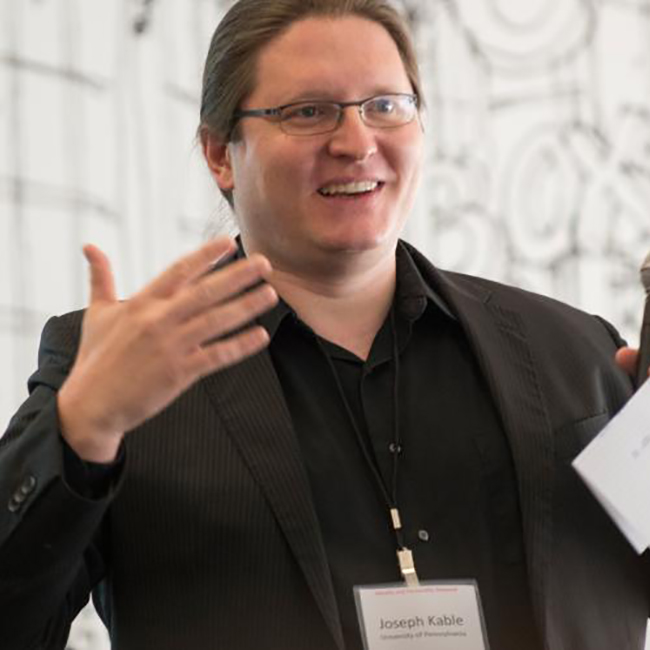Procrastinating on Climate Change
We asked Joseph Kable, Baird Term Professor of Psychology, why humans can’t seem to make the commitment to slow climate change.
Recent climate reports from the United Nations and the U.S. Intergovernmental Panel on Climate Change have indicated that we are running out of time before life as we know it is altered. Yet instead of the all-out response called for by these reports, the U.S. has pulled out of the Paris Accord, while Paris itself has seen riots spurred by an increased fuel tax. China continues to construct new coal-fired power plants. We use plastic bags and remotely start our cars 15 minutes early to warm them up. Why are we not taking steps to curb climate change?
Joseph Kable, Baird Term Professor of Psychology, studies how people make (or don’t make) decisions. He calls the circumstances around climate change a “perfect storm of features” that’s leading us to not act.
According to Kable, humans value future outcomes less than immediate consequences. Our caveperson ancestors were designed to worry about where their next meal was coming from, not whether their cell phone use would drown New Orleans.
Kable does experiments in which he offers people $20 now or $40 in three months. Half take the money now. “So that’s your own self three months from now,” he says. If we can’t put off a reward to benefit our future selves, it’s hard to expect us to do so to benefit others decades from now: “People’s bias is to just not care.”
Responding to climate change also demands collective action. “You layer on top of this temporal myopia the fact that it’s a coordination problem,” Kable says, “and it’s basically a classic prisoner’s dilemma” (an imaginary situation in game theory that shows why two individuals might not cooperate, even if it appears it’s in their best interests to do so).
“We’d all be better off if we came to an agreement to reduce carbon emissions and took the hard steps to try to forestall the effects on the climate,” Kable adds. “But every individual, like every country, has the incentive to say, well, it’s not going to make much difference if I opt out. Those kinds of efforts among individuals in a group are already hard, and now you’re talking about trying to do it at the international level. It just becomes that much more difficult.”
Kable says there are ways to help overcome these innate biases, including making the threat seem personal and vivid, and giving concrete examples of consequences. The focus on polar bears, the naming of specific cities that would be threatened, and maps from the National Oceanic and Atmospheric Administration that predict that the average daytime temperature in July will approach 100 degrees in much of the U.S. by mid-century are all ways of doing this.
The coordination issue is more intractable. Signing and publicly committing to agreements make it more likely that nations will comply, but these work better when there are enforced consequences for non-cooperation—something countries don’t want to agree to. One alternative is to reward or honor those who do uphold their commitments.
Action is also thwarted by issues with how we make judgements. One factor is motivated reasoning, when humans are inclined to agree with ideas that fit in with their values or beliefs. “Climate change has become associated with politics in the U.S., and politics have become more a part of the identity of Americans—where it’s not a set of beliefs that are really important to you but part of who you are,” says Kable. “So anything that interacts with this is going to be subjected to these motivated reasonings.
“We’re not always good at thinking about predictions and probabilities in shades of gray or levels of confidence,” he adds. “This is also a time scale that people aren’t used to thinking about.”
We’re not great at conceptualizing numbers, either. Kable cites Jonathan Baron, Professor of Psychology, who has done studies about our insensitivity to scale. “We would commit the same amount of money to save one member of an endangered species as 10 or 100 or 1,000. The categorical judgement says yes, that’s important, but scaling that up for scope is not something that we do well intuitively.”
Is there anything an individual can do? Social influence is important, says Kable, and having a norm can sustain coordination: “The idea that this is the right thing to do, everyone’s going to be expecting you to do it, and they’re going to be disappointed in you and shame you if you don’t do it. That’s a powerful way to sustain coordinated group activity.”
In the end, it may come down to the future becoming more and more present. “Air quality in the big cities in China is not an abstract issue,” says Kable, who was there last spring. “It’s that you go outside some days and can’t breathe. That has created bottom-up pressure to make changes to improve that situation. People said, okay, we’ve got to do something about this.”



